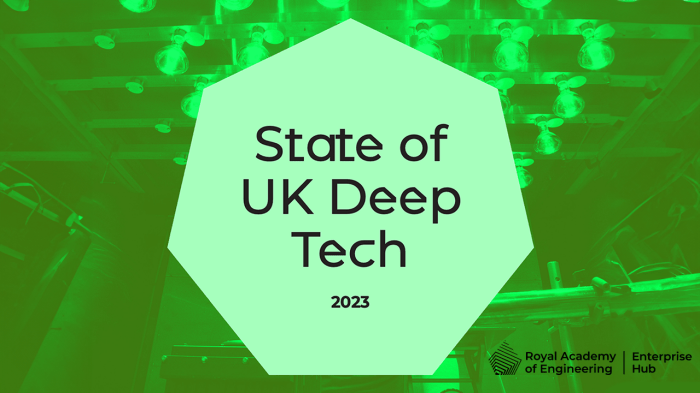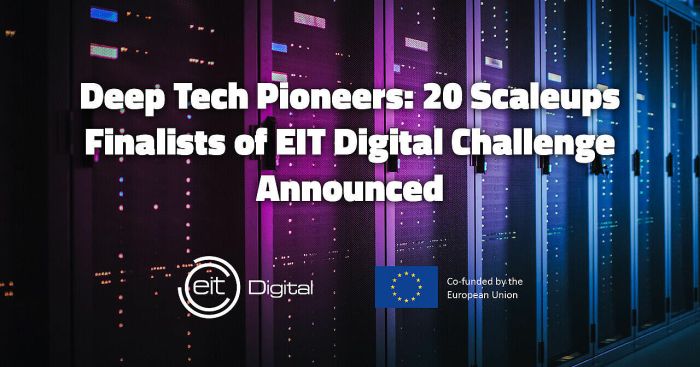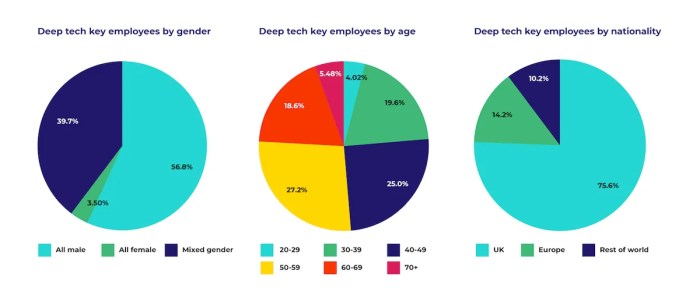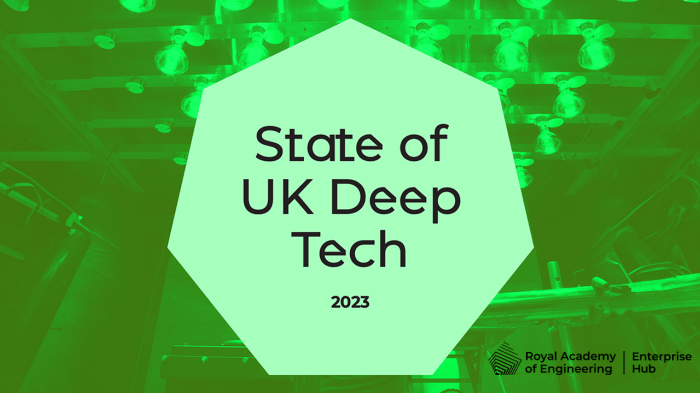
UK Deep Tech Diversity Challenge: Building a More Inclusive Future
The UK Deep Tech Diversity Challenge is a critical issue facing the burgeoning UK tech sector. While the UK boasts a thriving deep tech landscape, with cutting-edge innovations in fields like artificial intelligence, quantum computing, and biotechnology, the industry struggles with a lack of diversity.
This lack of representation not only limits the talent pool but also hinders innovation and ethical development.
The UK Deep Tech Diversity Challenge is a call to action, urging stakeholders to address the systemic barriers preventing underrepresented groups from fully participating in this exciting and impactful sector. By creating a more inclusive environment, we can unlock the full potential of deep tech and ensure its benefits reach all corners of society.
The UK Deep Tech Landscape
The UK is a global leader in deep tech, with a thriving ecosystem of startups, scaleups, and research institutions. The sector is characterized by its focus on developing cutting-edge technologies with the potential to solve some of the world’s most pressing challenges.
Key Areas of Focus
The UK deep tech landscape is diverse, encompassing a wide range of areas, including:
- Artificial Intelligence (AI):The UK is a world leader in AI research and development, with a strong focus on areas such as machine learning, natural language processing, and computer vision.
- Biotechnology:The UK boasts a vibrant biotechnology sector, with companies developing innovative solutions in areas such as gene editing, drug discovery, and diagnostics.
- Quantum Computing:The UK is a pioneer in quantum computing research, with leading universities and companies developing cutting-edge technologies in this rapidly growing field.
- Cybersecurity:The UK is a global leader in cybersecurity, with a strong focus on developing innovative solutions to protect against cyber threats.
Major Players
The UK deep tech landscape is home to a number of leading companies, including:
- DeepMind:A leading AI research company, acquired by Google in 2014, known for its breakthroughs in areas such as game playing and protein folding.
- Graphcore:A leading developer of AI processors, aiming to revolutionize the way AI is trained and deployed.
- Oxford Nanopore Technologies:A leading developer of nanopore sequencing technology, enabling faster and more affordable DNA sequencing.
- BenevolentAI:A leading AI drug discovery company, using AI to accelerate the development of new medicines.
- Darktrace:A leading cybersecurity company, specializing in AI-powered threat detection and response.
Diversity and Inclusion Challenges
Despite its strength, the UK deep tech sector faces significant challenges in terms of diversity and inclusion.
“The lack of diversity in the tech industry is a major problem, and it’s particularly acute in the deep tech sector. We need to do more to encourage people from all backgrounds to pursue careers in this field.”
Statistics and Research Findings
Research consistently highlights the lack of diversity within the UK deep tech workforce. For example:
- A 2021 report by the UK government found that only 17% of the UK tech workforce is female. This figure is even lower in deep tech, with some estimates suggesting that women make up less than 10% of the workforce in this sector.
- A 2020 study by the Royal Society found that only 12% of UK university professors in computer science are women.
- A 2022 report by the Diversity VC found that only 1% of venture capital funding in the UK goes to companies founded by women.
The Importance of Diversity in Deep Tech

Deep tech, with its potential to revolutionize industries and address global challenges, thrives on innovation. To achieve this, diversity is not just a nice-to-have, but a crucial ingredient for success. A diverse workforce, encompassing a range of backgrounds, perspectives, and experiences, is vital for fostering creativity, problem-solving, and ethical development within the deep tech sector.
The Benefits of Diversity for Innovation
A diverse workforce brings together a wide range of perspectives and experiences, leading to a more comprehensive understanding of problems and innovative solutions. This is particularly important in deep tech, where complex challenges require multi-disciplinary approaches.
- Different backgrounds lead to different approaches: Individuals from diverse backgrounds bring unique perspectives, knowledge, and skill sets to the table. This fosters a more holistic understanding of problems and encourages creative solutions that might not be considered otherwise. For example, a team with members from various engineering disciplines, social sciences, and humanities can approach a problem like developing an AI-powered healthcare system with a more comprehensive understanding of the technical, ethical, and social implications.
- Diverse teams are more likely to come up with groundbreaking ideas: Studies have shown that teams with diverse members are more likely to generate innovative ideas and solutions. This is because diverse perspectives challenge assumptions and encourage out-of-the-box thinking. In the realm of deep tech, where breakthroughs are crucial, a diverse team can lead to more impactful inventions and discoveries.
- Diversity in the workforce helps to create a more inclusive and welcoming environment: This attracts and retains talent from a wider pool of individuals, ultimately leading to a more diverse and innovative workforce.
The Role of Diversity in Ethical Deep Tech Development
Deep tech has the potential to address some of the world’s most pressing challenges, but it also carries the risk of exacerbating existing inequalities if not developed responsibly. Diversity plays a critical role in ensuring that deep tech solutions are developed and deployed ethically.
- Diverse teams can anticipate and mitigate potential biases: By bringing together individuals from various backgrounds and experiences, deep tech teams can better identify and address potential biases that might be embedded in their algorithms or systems. This is crucial for developing AI and other deep tech solutions that are fair, unbiased, and equitable.
For example, a diverse team developing facial recognition technology can consider the potential for bias in the datasets used to train the system, ensuring that it doesn’t disproportionately disadvantage certain demographics.
- Diversity helps to ensure that deep tech solutions are developed with the needs of all users in mind: By including individuals from different backgrounds, cultures, and communities in the development process, deep tech teams can ensure that their solutions are inclusive and meet the needs of a wider range of users. This is particularly important for developing technologies that address social and environmental challenges, where the impact on different communities needs to be considered.
The UK Deep Tech Diversity Challenge is all about opening up opportunities in the tech world, and this news about Apple Vision Pro is incredibly exciting. It seems like the possibilities for immersive experiences are exploding, and with Unity’s official support for app development, apple vision pro just got a huge boost for new games and experiences unity now has official support for app development , we’re about to see a whole new wave of innovation.
This kind of progress is exactly what the UK Deep Tech Diversity Challenge is all about – making sure everyone has a chance to be a part of it.
- Diversity fosters ethical discussions and decision-making: A diverse team is more likely to engage in robust discussions about the ethical implications of deep tech development. This helps to ensure that the technology is developed and deployed in a way that is responsible and benefits society as a whole.
The UK Deep Tech Diversity Challenge

The UK deep tech sector, with its potential to drive innovation and economic growth, faces a critical challenge: the lack of diversity. While the sector boasts groundbreaking advancements, its workforce remains disproportionately dominated by white men. This lack of representation hinders the sector’s ability to reach its full potential and contributes to a less inclusive and equitable environment.
Barriers to Entry
The underrepresentation of diverse groups in deep tech is not simply a matter of chance. It is a consequence of systemic barriers that make it difficult for individuals from underrepresented backgrounds to enter and thrive in the sector. These barriers manifest in various forms, creating a challenging landscape for aspiring deep tech professionals.
The UK Deep Tech Diversity Challenge is all about fostering a more inclusive and diverse landscape in this rapidly growing sector. One key aspect of creating a welcoming environment is ensuring clear communication, and that’s where the concept of “align content right left word” align content right left word comes into play.
By understanding how to effectively communicate with different audiences, we can break down barriers and create a more equitable space for everyone to thrive in the UK’s deep tech scene.
- Lack of Access to Funding:Funding is crucial for startups and research projects in deep tech. However, venture capitalists and investors often exhibit unconscious biases, favoring companies led by individuals who resemble themselves. This creates a significant barrier for underrepresented founders and entrepreneurs who struggle to secure the necessary funding to launch and grow their ventures.
- Limited Mentorship and Networking Opportunities:Mentorship and networking are vital for career advancement in any field, but they are particularly crucial in deep tech, where knowledge sharing and collaboration are essential. Underrepresented individuals often lack access to established networks and mentors, hindering their ability to build connections, gain insights, and advance their careers.
- Unconscious Bias in Recruitment:Unconscious biases can influence the recruitment process, leading to the selection of candidates who fit a certain profile, often perpetuating existing imbalances. This bias can manifest in the wording of job descriptions, the selection of interview questions, and the evaluation of candidates, resulting in a lack of diversity in the hiring pool.
The Role of Unconscious Bias and Systemic Inequalities
Unconscious bias and systemic inequalities play a significant role in perpetuating the lack of diversity in deep tech. Unconscious bias refers to the automatic judgments and assumptions we make about individuals based on their social identities. These biases can lead to discriminatory practices, even when individuals are not consciously intending to discriminate.
Systemic inequalities, on the other hand, refer to the ingrained patterns of disadvantage that affect certain groups based on their race, gender, socioeconomic status, or other factors.
“Unconscious bias is a significant challenge in the tech industry, as it can lead to the exclusion of talented individuals from underrepresented groups.”
These biases and inequalities create a cycle of disadvantage, making it harder for underrepresented individuals to enter and succeed in the deep tech sector.
- Lack of Role Models:The lack of visible role models from underrepresented groups can discourage individuals from pursuing careers in deep tech. When young people do not see themselves represented in leadership positions or in the broader tech community, it can create a sense of unbelonging and limit their aspirations.
The UK Deep Tech Diversity Challenge is all about making the tech industry more inclusive. One way to do this is by making technology more accessible, and that’s where voice assistants like Siri come in. If you’re looking for ways to use Siri in your business, check out this helpful apple siri cheat sheet for business.
By empowering everyone to use technology, we can create a more diverse and innovative deep tech landscape.
- Stereotyping and Prejudice:Stereotypes and prejudices can influence perceptions of individuals from underrepresented groups, leading to discrimination and limited opportunities. These biases can manifest in the workplace, in funding decisions, and in networking circles, creating an environment that is not welcoming or inclusive.
Initiatives and Programs: Uk Deep Tech Diversity Challenge

The UK deep tech sector is witnessing a surge in initiatives and programs aimed at promoting diversity and inclusion. These initiatives are crucial for fostering a more representative and equitable ecosystem, unlocking the full potential of talent and innovation.
Existing Initiatives and Programs
Several initiatives and programs are actively working to address the diversity gap in the UK deep tech sector. These initiatives adopt diverse approaches, targeting different stages of the talent pipeline, from education and training to mentorship and funding opportunities.
- The UK Deep Tech Diversity Challenge:This challenge, launched in 2023, aims to identify and support innovative solutions that address the lack of diversity in the UK deep tech sector. The challenge focuses on promoting inclusivity and accessibility, particularly for underrepresented groups.
- The Women in Tech Awards:These awards celebrate the achievements of women in the technology sector and highlight the importance of gender diversity in tech. The awards provide a platform for recognizing and inspiring women in tech, promoting their visibility and leadership.
- The Black Tech Network:This organization provides a platform for Black professionals in tech to connect, collaborate, and support each other. The network offers mentorship, networking opportunities, and resources to help Black tech professionals succeed in their careers.
- The Tech Talent Charter:This charter, signed by over 500 organizations, commits to promoting diversity and inclusion in the tech sector. The charter encourages organizations to adopt best practices for attracting, retaining, and developing diverse talent.
- The Ada Lovelace Institute:This independent research institute focuses on the ethical and societal implications of artificial intelligence. The institute conducts research and provides insights on how to ensure that AI technologies are developed and deployed in a fair and inclusive manner.
Effectiveness and Limitations, Uk deep tech diversity challenge
While these initiatives are making progress in promoting diversity in the UK deep tech sector, there are still limitations and areas for improvement.
- Limited Reach:Some initiatives may have a limited reach, failing to engage with individuals from underrepresented backgrounds who may not be aware of the opportunities available.
- Lack of Funding:Many initiatives face challenges in securing adequate funding to scale their operations and impact. This can hinder their ability to reach a wider audience and provide comprehensive support.
- Lack of Collaboration:There is a need for greater collaboration between different initiatives to avoid duplication of efforts and create a more cohesive and impactful approach to promoting diversity.
- Measuring Impact:It can be challenging to accurately measure the impact of diversity initiatives, making it difficult to assess their effectiveness and identify areas for improvement.
Comparison of Initiatives
The following table provides a comparison of different initiatives, highlighting their target audience, scope, and impact:
| Initiative | Target Audience | Scope | Impact |
|---|---|---|---|
| UK Deep Tech Diversity Challenge | Deep tech startups and organizations | Identifying and supporting innovative solutions to address the lack of diversity in the UK deep tech sector. | Promoting inclusivity and accessibility, particularly for underrepresented groups. |
| Women in Tech Awards | Women in the technology sector | Celebrating the achievements of women in tech and highlighting the importance of gender diversity. | Recognizing and inspiring women in tech, promoting their visibility and leadership. |
| Black Tech Network | Black professionals in tech | Providing a platform for Black professionals to connect, collaborate, and support each other. | Offering mentorship, networking opportunities, and resources to help Black tech professionals succeed in their careers. |
| Tech Talent Charter | Tech organizations | Committing to promoting diversity and inclusion in the tech sector. | Encouraging organizations to adopt best practices for attracting, retaining, and developing diverse talent. |
| Ada Lovelace Institute | Researchers, policymakers, and the public | Conducting research and providing insights on how to ensure that AI technologies are developed and deployed in a fair and inclusive manner. | Promoting ethical and responsible AI development and deployment. |
Future Directions and Recommendations
The UK Deep Tech Diversity Challenge is a complex issue requiring a multifaceted approach. To effectively address this challenge, it is crucial to involve various stakeholders, including the government, industry, and educational institutions, in collaborative efforts. This section Artikels key recommendations and actionable steps to foster a more inclusive and diverse deep tech ecosystem in the UK.
Government Initiatives
The government plays a vital role in creating a supportive environment for diversity and inclusion in the deep tech sector. The following recommendations aim to empower underrepresented groups and promote equitable opportunities.
- Establish targeted funding programs:The government should allocate dedicated funding for startups and projects led by individuals from underrepresented backgrounds. This can be achieved through initiatives like grants, seed funding, and accelerator programs specifically designed to support diverse entrepreneurs.
- Promote diversity in government-funded research projects:Government-funded research projects should actively incorporate diversity and inclusion principles. This can involve setting diversity targets for research teams, providing training on unconscious bias, and promoting collaborations with universities and institutions with strong diversity initiatives.
- Develop mentorship and networking programs:Government-supported mentorship and networking programs can connect individuals from underrepresented groups with experienced professionals in the deep tech sector. This can provide guidance, support, and access to valuable connections.
- Implement diversity and inclusion training for government officials:Training programs for government officials on diversity and inclusion can raise awareness, challenge unconscious biases, and equip them with the knowledge and skills to promote equitable policies and initiatives.
Industry Collaboration
Industry players have a significant role to play in fostering a more inclusive and diverse deep tech ecosystem. The following recommendations highlight actionable steps for industry stakeholders.
- Establish diversity targets and reporting mechanisms:Companies should set diversity targets for their workforce, including leadership positions, and regularly report on their progress. This will hold them accountable and demonstrate their commitment to inclusivity.
- Develop inclusive hiring practices:Companies should adopt inclusive hiring practices that go beyond traditional recruitment methods. This includes using diverse talent pools, removing unconscious bias from the selection process, and offering flexible work arrangements.
- Promote mentorship and sponsorship programs:Industry-led mentorship and sponsorship programs can provide support and guidance to individuals from underrepresented groups. This can help them advance their careers, gain valuable experience, and build networks within the deep tech sector.
- Partner with educational institutions and community organizations:Companies should collaborate with educational institutions and community organizations to provide internships, apprenticeships, and training programs to individuals from underrepresented backgrounds. This will expose them to the deep tech sector and provide opportunities for career development.
Educational Initiatives
Educational institutions have a critical role in shaping the future workforce and fostering a more inclusive deep tech ecosystem. The following recommendations highlight actionable steps for educational institutions.
- Promote STEM education in underrepresented communities:Educational institutions should actively promote STEM education in underrepresented communities through outreach programs, workshops, and mentorship initiatives. This will encourage more individuals from diverse backgrounds to pursue STEM careers.
- Develop inclusive curricula and learning environments:Curricula and learning environments should be designed to be inclusive and accessible to all students. This includes addressing unconscious biases in teaching materials, providing accommodations for students with disabilities, and fostering a culture of respect and inclusivity.
- Offer targeted support and guidance for students from underrepresented groups:Educational institutions should provide targeted support and guidance to students from underrepresented groups through mentorship programs, academic advising, and career counseling. This will help them navigate their academic journey and prepare for successful careers in deep tech.
- Promote diversity in faculty and leadership:Educational institutions should actively recruit and retain diverse faculty and leadership. This will create a more inclusive environment for students and encourage a wider range of perspectives and experiences.







